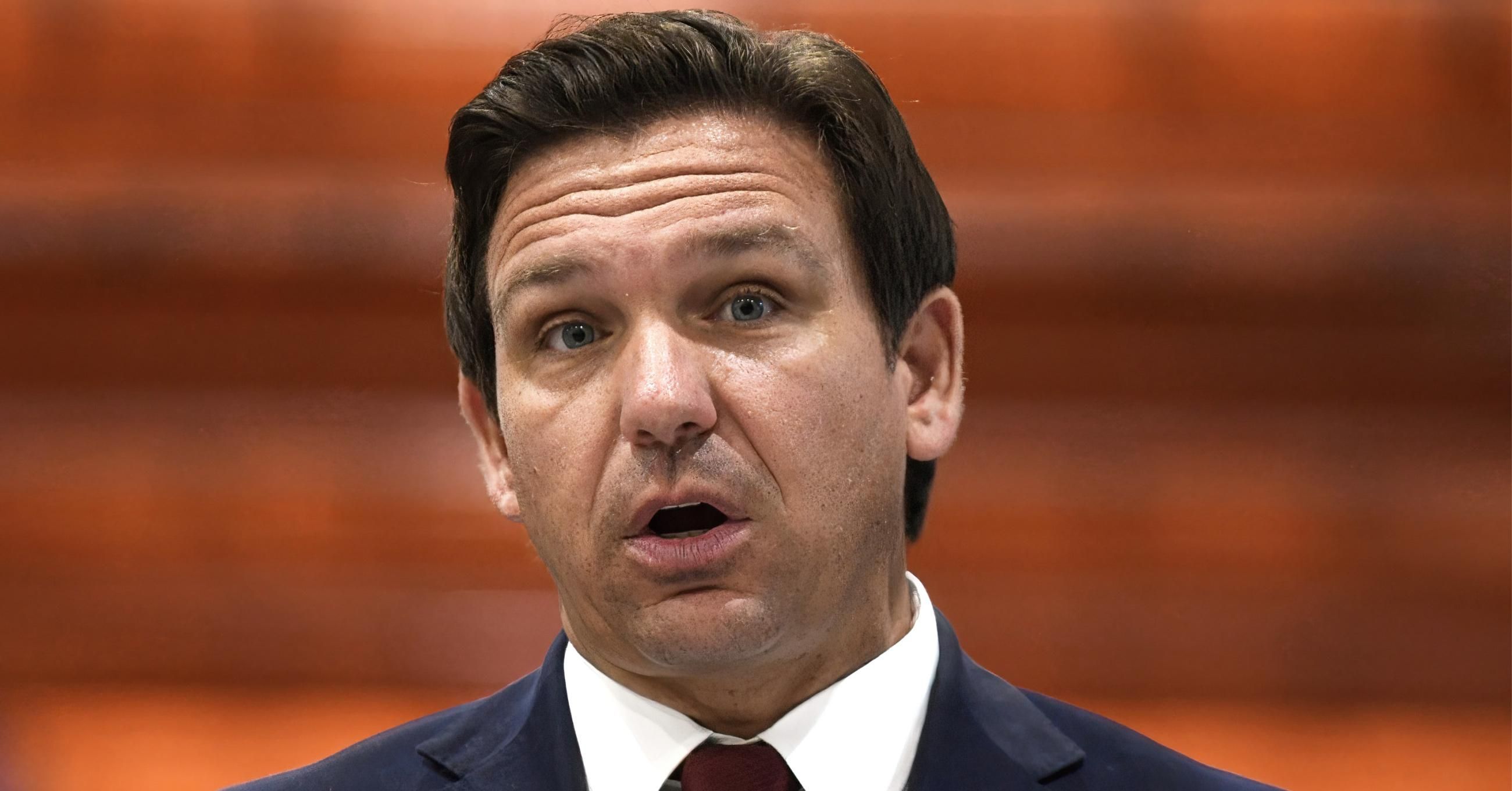'A Crisis Coming': The Twin Threats to American Democracy
David LeonhardtThe New York Times
Sat, September 17, 2022

The United States faces two distinct challenges, the movement by Republicans who refuse to accept defeat in an election and a growing disconnect between political power and public opinion. (Matt Chase/The New York Times)
LONG READ
The United States has experienced deep political turmoil several times before over the past century. The Great Depression caused Americans to doubt the country’s economic system. World War II and the Cold War presented threats from global totalitarian movements. The 1960s and ’70s were marred by assassinations, riots, a losing war and a disgraced president.
These earlier periods were each more alarming in some ways than anything that has happened in the United States recently. Yet during each of those previous times of tumult, the basic dynamics of American democracy held firm. Candidates who won the most votes were able to take power and attempt to address the country’s problems.
The current period is different. As a result, the United States today finds itself in a situation with little historical precedent. American democracy is facing two distinct threats, which together represent the most serious challenge to the country’s governing ideals in decades.
The first threat is acute: a growing movement inside one of the country’s two major parties — the Republican Party — to refuse to accept defeat in an election.
The violent Jan. 6, 2021, attack on Congress, meant to prevent the certification of President Joe Biden’s election, was the clearest manifestation of this movement, but it has continued since then. Hundreds of elected Republican officials around the country falsely claim that the 2020 election was rigged. Some of them are running for statewide offices that would oversee future elections, potentially putting them in position to overturn an election in 2024 or beyond.
“There is the possibility, for the first time in American history, that a legitimately elected president will not be able to take office,” said Yascha Mounk, a political scientist at Johns Hopkins University who studies democracy.
The second threat to democracy is chronic but also growing: The power to set government policy is becoming increasingly disconnected from public opinion.
The run of recent Supreme Court decisions — both sweeping and, according to polls, unpopular — highlights this disconnect. Although the Democratic Party has won the popular vote in seven of the past eight presidential elections, a Supreme Court dominated by Republican appointees seems poised to shape American politics for years, if not decades. And the court is only one of the means through which policy outcomes are becoming less closely tied to the popular will.
Two of the past four presidents have taken office despite losing the popular vote. Senators representing a majority of Americans are often unable to pass bills, partly because of the increasing use of the filibuster. Even the House, intended as the branch of the government that most reflects the popular will, does not always do so because of the way districts are drawn.
“We are far and away the most countermajoritarian democracy in the world,” said Steven Levitsky, a professor of government at Harvard University and a co-author of the book “How Democracies Die,” with Daniel Ziblatt.
The causes of the twin threats to democracy are complex and debated among scholars.
The chronic threats to democracy generally spring from enduring features of American government, some written into the Constitution. But they did not conflict with majority opinion to the same degree in past decades. One reason is that more populous states, whose residents receive less power because of the Senate and the Electoral College, have grown so much larger than small states.
The acute threats to democracy — and the rise of authoritarian sentiment, or at least the acceptance of it, among many voters — have different causes. They partly reflect frustration over nearly a half-century of slow-growing living standards for the American working class and middle class. They also reflect cultural fears, especially among white people, that the United States is being transformed into a new country, more racially diverse and less religious, with rapidly changing attitudes toward gender, language and more.
The economic frustrations and cultural fears have combined to create a chasm in American political life between prosperous, diverse major metropolitan areas and more traditional, religious and economically struggling smaller cities and rural areas. The first category is increasingly liberal and Democratic, the second increasingly conservative and Republican.
The political contest between the two can feel existential to people in both camps, with disagreements over nearly every prominent issue. “When we’re voting, we’re not just voting for a set of policies but for what we think makes us Americans and who we are as a people,” said Lilliana Mason, a political scientist and the author of “Uncivil Agreement: How Politics Became Our Identity.” “If our party loses the election, then all of these parts of us feel like losers.”
These sharp disagreements have led many Americans to doubt the country’s system of government. In a recent poll by Quinnipiac University, 69% of Democrats and 69% of Republicans said that democracy was “in danger of collapse.” Of course, the two sides have very different opinions about the nature of the threat.
Many Democrats share the concerns of historians and scholars who study democracy, pointing to the possibility of overturned election results and the deterioration of majority rule. “Equality and democracy are under assault,” Biden said in a speech this month in front of Independence Hall in Philadelphia. “We do ourselves no favor to pretend otherwise.”
Many Republicans have defended their increasingly aggressive tactics by saying they are trying to protect American values. In some cases, these claims rely on falsehoods — about election fraud, Biden’s supposed “socialism,” Barack Obama’s birthplace and more.
In others, they are rooted in anxiety over real developments, including illegal immigration and “cancel culture.” Some on the left now consider widely held opinions among conservative and moderate Americans — on abortion, policing, affirmative action, COVID-19 and other subjects — to be so objectionable that they cannot be debated. In the view of many conservatives and some experts, this intolerance is stifling open debate at the heart of the American political system.
The divergent sense of crisis on left and right can itself weaken democracy, and it has been exacerbated by technology.
Conspiracy theories and outright lies have a long American history, dating to the personal attacks that were a staple of the partisan press during the 18th century. In the mid-20th century, tens of thousands of Americans joined the John Birch Society, a far-right group that claimed Dwight Eisenhower was a secret communist.
Today, however, falsehoods can spread much more easily, through social media and a fractured news environment. In the 1950s, no major television network spread the lies about Eisenhower. In recent years, the country’s most watched cable channel, Fox News, regularly promoted falsehoods about election results, Obama’s birthplace and other subjects.
These same forces — digital media, cultural change and economic stagnation in affluent countries — help explain why democracy is also struggling in other parts of the world. Only two decades ago, at the turn of the 21st century, democracy was the triumphant form of government around the world, with autocracy in retreat in the former Soviet empire, Argentina, Brazil, Chile, South Africa, South Korea and elsewhere. Today, the global trend is moving in the other direction.
In the late 1990s, 72 countries were democratizing, and only three were growing more authoritarian, according to data from V-Dem, a Swedish institute that monitors democracy. Last year, only 15 countries grew more democratic, while 33 slid toward authoritarianism.
Some experts remain hopeful that the growing attention in the United States to democracy’s problems can help avert a constitutional crisis here. Already, Donald Trump’s efforts to overturn the 2020 election failed, partly because of the refusal of many Republican officials to participate, and both federal and state prosecutors are investigating his actions. And while the chronic decline of majority rule will not change anytime soon, it is also part of a larger historical struggle to create a more inclusive American democracy.
Still, many experts point out that it still not clear how the country will escape a larger crisis, such as an overturned election, at some point in the coming decade. “This is not politics as usual,” said Carol Anderson, a professor at Emory University and the author of the book, “One Person, No Vote,” about voter suppression. “Be afraid.”
The Will of the Majority
The founders did not design the United States to be a pure democracy.
They distrusted the classical notion of direct democracy, in which a community came together to vote on each important issue, and believed it would be impractical for a large country. They did not consider many residents of the new country to be citizens who deserved a voice in political affairs, including Natives, enslaved Africans and women. The founders also wanted to constrain the national government from being too powerful, as they believed was the case in Britain. And they had the practical problem of needing to persuade 13 states to forfeit some of their power to a new federal government.
Instead of a direct democracy, the founders created a republic, with elected representatives to make decisions, and a multilayered government in which different branches checked one another. The Constitution also created the Senate, where every state had an equal say regardless of population.
Pointing to this history, some Republican politicians and conservative activists have argued that the founders were comfortable with minority rule. “Of course we’re not a democracy,” Sen. Mike Lee, R-Utah, has written.
But the historical evidence suggests that the founders believed that majority will — defined as the prevailing view of enfranchised citizens — should generally dictate national policy, as George Thomas of Claremont McKenna College and other constitutional scholars have explained.
In the Federalist Papers, James Madison equated “a coalition of a majority of the whole society” with “justice and the general good.” Alexander Hamilton made similar points, describing “representative democracy” as “happy, regular and durable.” It was a radical idea at the time.
For most of American history, the idea has prevailed. Even with the existence of the Senate, the Electoral College and the Supreme Court, political power has reflected the views of people who had the right to vote. “To say we’re a republic not a democracy ignores the past 250 years of history,” Ziblatt, a political scientist at Harvard University, said.
Before 2000, only three candidates won the presidency while losing the popular vote (John Quincy Adams, Rutherford Hayes and Benjamin Harrison), and each served only a single term. During the same period, parties that won repeated elections were able to govern, including the Democratic-Republican Party of Thomas Jefferson’s time, the New Deal Democrats and the Reagan Republicans.
The situation has changed in the 21st century. The Democratic Party is in the midst of a historic winning streak. In seven of the past eight presidential elections, stretching back to Bill Clinton’s 1992 victory, the Democratic nominee has won the popular vote. Over more than two centuries of American democracy, no party has previously fared so well over such an extended period.
Yet the current period is hardly a dominant Democratic age.
What changed? One crucial factor is that, in the past, the parts of the country granted outsize power by the Constitution — less populated states, which tend to be more rural — voted in broadly similar ways as large states and urban areas.
This similarity meant that the small-state bonus in the Senate and Electoral College had only a limited effect on national results. Both Democrats and Republicans benefited and suffered from the Constitution’s undemocratic features.
Democrats sometimes won small states like Idaho, Montana, Utah and Wyoming in the mid-20th century. And California was long a swing state: Between the Great Depression and 2000, Democratic and Republican presidential candidates won it an equal number of times. That the Constitution conferred advantages on residents of small states and disadvantages on Californians did not reliably boost either party.
In recent decades, Americans have increasingly sorted themselves along ideological lines. Liberals have flocked to large metropolitan areas, which are heavily concentrated in big states like California, while residents of smaller cities and more rural areas have become more conservative.
This combination — the Constitution’s structure and the country’s geographic sorting — has created a disconnect between public opinion and election outcomes. It has affected every branch of the federal government: the presidency, Congress and even the Supreme Court.
In the past, “the system was still anti-democratic, but it didn’t have a partisan effect,” Levitsky said. “Now it’s undemocratic and has a partisan effect. It tilts the playing field toward the Republican Party. That’s new in the 21st century.”
In presidential elections, the small-state bias is important, but it is not even the main issue. A subtler factor — the winner-take-all nature of the Electoral College in most states — is. Candidates have never received extra credit for winning state-level landslides. But this feature did not used to matter very much, because landslides were rare in larger states, meaning that relatively few votes were “wasted,” as political scientists say.
Today, Democrats dominate a handful of large states, wasting many votes. In 2020, Biden won California by 29 percentage points; New York by 23 points; and Illinois by 17 points. Four years earlier, Hillary Rodham Clinton’s margins were similar.
This shift means that millions of voters in large metropolitan areas have moved away from the Republican Party without having any impact on presidential outcomes. That’s a central reason that both George W. Bush and Trump were able to win the presidency while losing the popular vote.
“We’re in a very different world today than when the system was designed,” said Mindy Romero, director of the Center for Inclusive Democracy at the University of Southern California. “The dynamic of being pushed aside is more obvious and I think more frustrating.”
Republicans sometimes point out that the system prevents a few highly populated states from dominating the country’s politics, which is true. But the flip is also true: The Constitution gives special privileges to the residents of small states. In presidential elections, many voters in large states have become irrelevant in a way that has no historical antecedent.
The Curse of Geographic Sorting
The country’s changing population patterns may have had an even bigger effect on Congress — especially the Senate — and the Supreme Court than the presidency.
The sorting of liberals into large metropolitan areas and conservatives into more rural areas is only one reason. Another is that large states have grown much more quickly than small states. In 1790, the largest state (Virginia) had about 13 times as many residents as the smallest (Delaware). Today, California has 68 times as many residents as Wyoming, 53 times as many as Alaska and at least 20 times as many as another 11 states.
Together, these trends mean that the Senate has a heavily pro-Republican bias that will last for the foreseeable future.
The Senate today is split 50-50 between the two parties. But the 50 Democratic senators effectively represent 186 million Americans, while the 50 Republican senators effectively represent 145 million. To win Senate control, Democrats need to win substantially more than half of the nationwide votes in Senate elections.
This situation has led to racial inequality in political representation. The residents of small states, granted extra influence by the Constitution, are disproportionately white, while large states are home to many more Asian American, Black and Latino voters.
In addition, two parts of the country that are disproportionately Black or Latino — Washington, D.C., and Puerto Rico — have no Senate representation. Washington has more residents than Vermont or Wyoming, and Puerto Rico has more residents than 20 states. As a result, the Senate gives a political voice to white Americans that is greater than their numbers.
The House of Representatives has a more equitable system for allocating political power. It divides the country into 435 districts, each with a broadly similar number of people (currently about 760,000). Still, House districts have two features that can cause the chamber’s makeup not to reflect national opinion, and both of them have become more significant in recent years.
The first is well known: gerrymandering. State legislatures often draw district boundaries and in recent years have become more aggressive about drawing them in partisan ways. In Illinois, for example, the Democrats who control the state government have packed Republican voters into a small number of House districts, allowing most other districts to lean Democratic. In Wisconsin, Republicans have done the opposite.
Because Republicans have been more forceful about gerrymandering than Democrats, the current House map slightly favors Republicans, likely by a few seats. At the state level, Republicans have been even bolder. Gerrymandering has helped them dominate the state legislatures in Michigan, North Carolina and Ohio, even though the states are closely divided.
Still, gerrymandering is not the only reason that House membership has become less reflective of national opinion in recent years. It may not even be the biggest reason, according to Jonathan A. Rodden, a political scientist at Stanford University. Geographic sorting is.
“Without a doubt, gerrymandering makes things worse for the Democrats,” Rodden has written, “but their underlying problem can be summed up with the old real estate maxim: location, location, location.” The increasing concentration of Democratic voters into large metro areas means that even a neutral system would have a hard time distributing these tightly packed Democratic voters across districts in a way that would allow the party to win more elections.
Instead, Democrats now win many House elections in urban areas by landslides, wasting many votes. In 2020, only 21 Republican House candidates won their elections by at least 50 percentage points; 47 Democrats did.
Looking at where many of these elections occurred helps make Rodden’s point. The landslide winners included Rep. Diana DeGette in Denver; Rep. Jerry Nadler in New York City; Rep. Jesús García in Chicago; Rep. Donald Payne Jr. in northern New Jersey; and Rep. Barbara Lee in Oakland, California. None of those districts are in states where Republicans have controlled the legislative boundaries, which means that they were not the result of Republican gerrymandering.
Again and again, geographic sorting has helped cause a growing disconnect between public opinion and election results, and this disconnect has shaped the Supreme Court as well. The court’s membership at any given time is dictated by the outcomes of presidential and Senate elections over the previous few decades. And if elections reflected popular opinion, Democratic appointees would dominate the court.
Every current justice has been appointed during one of the past nine presidential terms, and a Democrat has won the popular vote in seven of those nine and the presidency in five of the nine. Yet the court is now dominated by a conservative, six-member majority.
There are multiple reasons (including Ruth Bader Ginsburg’s decision not to retire in 2014 when a Democratic president and Senate could have replaced her). But the increasingly undemocratic nature of both the Electoral College and Senate play crucial roles.
Trump was able to appoint three justices despite losing the popular vote. (Bush is a more complex case, having made his court appointments after he won reelection and the popular vote in 2004.) Similarly, if Senate seats were based on population, none of Trump’s nominees — Justices Neil Gorsuch, Brett Kavanaugh and Amy Coney Barrett — would likely have been confirmed, said Michael J. Klarman, a law professor at Harvard. Senate Republicans also would not have been able to block Obama from filling a court seat during his final year in office.
Even Justice Clarence Thomas’ 1991 confirmation relied on the Senate’s structure: The 52 senators who voted to confirm him represented a minority of Americans.
The current court’s approach has magnified the disconnect between public opinion and government policy, because Republican-appointed justices have overruled Congress on some major issues. The list includes bills on voting rights and campaign finance that earlier Congresses passed along bipartisan lines. This term, the court issued rulings on abortion, climate policy and gun laws that seemed to be inconsistent with majority opinion, based on polls.
“The Republican justices wouldn’t say this and may not believe it,” Klarman said, “but everything they’ve done translates into a direct advantage for the Republican Party.”
In response to the voting rights decision, in 2013, Republican legislators in several states have passed laws making it more difficult to vote, especially in heavily Democratic areas. They have done so citing the need to protect election security, even though there has been no widespread fraud in recent years.
For now, the electoral effect of these decisions remains uncertain. Some analysts point out that the restrictions have not yet been onerous enough to hold down turnout. In the 2020 presidential election, the percentage of eligible Americans who voted reached the highest level in at least a century.
Other experts remain concerned that the new laws could ultimately swing a close election in a swing state. “When you have one side gearing up to say, ‘How do we stop the enemy from voting?’ that is dangerous to a democracy,” Anderson, the Emory professor, said.
An upcoming Supreme Court case may also allow state legislatures to impose even more voting restrictions. The court has agreed to hear a case in which Republican legislators in North Carolina argue that the Constitution gives them, and not state courts, the authority to oversee federal elections.
In recent years, state courts played an important role in constraining both Republican and Democratic legislators who tried to draw gerrymandered districts that strongly benefited one party. If the Supreme Court sides with the North Carolina legislature, gerrymandering might increase, as might laws establishing new barriers to voting.
Amplifying the Election Lies
If the only challenges to democracy involved these chronic, long-developing forces, many experts would be less concerned than they are. American democracy has always been flawed, after all.
But the slow-building ways in which majority rule is being undermined are happening at the same time that the country faces an immediate threat that has little precedent. A growing number of Republican officials are questioning a basic premise of democracy: that the losers of an election are willing to accept defeat.
The roots of the modern election-denier movement stretch back to 2008. When Obama was running for president and after he won, some of his critics falsely claimed that his victory was illegitimate because he was born in Kenya rather than Hawaii. This movement became known as birtherism, and Trump was among its proponents. By making the claims on Fox News and elsewhere, he helped transform himself from a reality television star into a political figure.
When he ran for president himself in 2016, Trump made false claims about election fraud central to his campaign. In the Republican primaries, he accused his closest competitor for the nomination, Sen. Ted Cruz, of cheating. In the general election against Hillary Clinton, Trump said he would accept the outcome only if he won. In 2020, after Biden won, the election lies became Trump’s dominant political message.
His embrace of these lies was starkly different from the approach of past leaders from both parties. In the 1960s, Ronald Reagan and Barry Goldwater ultimately isolated the conspiracists of the John Birch Society. In 2000, Al Gore urged his supporters to accept George W. Bush’s razor-thin victory, much as Richard Nixon had encouraged his supporters to do so after he narrowly lost to John F. Kennedy in 1960. In 2008, when a Republican voter at a rally described Obama as an Arab, Sen. John McCain, the Republican nominee and Obama’s opponent, corrected her.
Trump’s promotion of the falsehoods, by contrast, turned them into a central part of the Republican Party’s message. About two-thirds of Republican voters say that Biden did not win the 2020 election legitimately, according to polls. Among Republican candidates running for statewide office this year, 47% have refused to accept the 2020 result, according to a FiveThirtyEight analysis.
Most Republican politicians who have confronted Trump, on the other hand, have since lost their jobs or soon will. Of the 10 House Republicans who voted to impeach him for his role in the Jan. 6 attack, for example, eight have since decided to retire or lost Republican primaries, including Rep. Liz Cheney of Wyoming.
“By any indication, the Republican Party — upper-level, midlevel and grassroots — is a party that can only be described as not committed to democracy,” Levitsky said. He added that he was significantly more concerned about American democracy than when his and Ziblatt’s book, “How Democracies Die,” came out in 2018.
Juan José Linz, a political scientist who died in 2013, coined the term “semi-loyal actors” to describe political officials who typically do not initiate attacks on democratic rules or institutions but who also do not attempt to stop these attacks. Through their complicity, these semi-loyal actors can cause a party and a country to slide toward authoritarianism.
That’s what happened in Europe in the 1930s and in Latin America in the 1960s and ’70s. More recently, it has happened in Hungary. Now there are similar signs in the United States.
Often, even Republicans who cast themselves as different from Trump include winking references to his conspiracy theories in their campaigns, saying that they, too, believe “election integrity” is a major problem. Gov. Glenn Youngkin of Virginia and Gov. Ron DeSantis of Florida, for example, have both recently campaigned on behalf of election deniers.
In Congress, Republican leaders have largely stopped criticizing the violent attack on the Capitol. Rep. Kevin McCarthy, the Republican House leader, has gone so far as to signal his support for colleagues — like Rep. Marjorie Taylor Greene, R-Ga. — who have used violent imagery in public comments. Greene, before being elected to Congress, said that she supported the idea of executing prominent Democrats.
“When mainstream parties tolerate these guys, make excuses for them, protect them, that’s when democracy gets in trouble,” Levitsky said. “There have always been Marjorie Taylor Greenes. What I pay closer attention to is the behavior of the Kevin McCarthys.”
The party’s growing acceptance of election lies raises the question of what would happen if Trump or another future presidential nominee tried to replay his 2016 attempt to overturn the result.
In 11 states this year, the Republican nominee for secretary of state, a position that typically oversees election administration, qualifies as an “election denier,” according to States United Action, a research group. In 15 states, the nominee for governor is a denier, and in 10 states, the attorney general nominee is.
The growth of the election-denier movement has created a possibility that would have seemed unthinkable not so long ago. It remains unclear whether the loser of the next presidential election will concede or will instead try to overturn the outcome.
‘There Is a Crisis Coming’
There are still many scenarios in which the United States will avoid a democratic crisis.
In 2024, Biden could win reelection by a wide margin — or a Republican other than Trump could win by a wide margin. Trump might then fade from the political scene, and his successors might choose not to embrace election falsehoods. The era of Republican election denial could prove to be brief.
It is also possible that Trump or another Republican nominee will try to reverse a close defeat in 2024 but will fail, as happened in 2020. Then, Brad Raffensperger, Georgia’s Republican secretary of state, rebuffed Trump after he directed him to “find 11,780 votes,” and the Supreme Court refused to intervene as well. More broadly, Mitch McConnell, the Republican leader in the Senate, recently said that the United States had “very little voter fraud.”
If a Republican were again to try to overturn the election and to fail, the movement might also begin to fade. But many democracy experts worry that these scenarios may be wishful thinking.
Trump’s most likely successors as party leader also make or tolerate false claims about election fraud. The movement is bigger than one person and arguably always has been; some of the efforts to make voting more onerous, which are generally justified with false suggestions of widespread voter fraud, predated Trump’s 2016 candidacy.
To believe that Republicans will not overturn a close presidential loss in coming years seems to depend on ignoring the public positions of many Republican politicians. “The scenarios by which we don’t have a major democracy crisis by the end of the decade seem rather narrow,” Mounk of Johns Hopkins said.
And Levitsky said, “It’s not clear how the crisis is going to manifest itself, but there is a crisis coming.” He added, “We should be very worried.”
The most promising strategy for avoiding an overturned election, many scholars say, involves a broad ideological coalition that isolates election deniers. But it remains unclear how many Republican politicians would be willing to join such a coalition.
It is also unclear whether Democratic politicians and voters are interested in making the compromises that would help them attract more voters. Many Democrats have instead embraced a purer version of liberalism in recent years, especially on social issues. This shift to the left has not prevented the party from winning the popular vote in presidential elections, but it has hurt Democrats outside of major metropolitan areas and, by extension, in the Electoral College and congressional elections.
If Democrats did control both the White House and Congress — and by more than a single vote, as they now do in the Senate — they have signaled that they would attempt to pass legislation to address both the chronic and acute threats to democracy.
The House last year passed a bill to protect voting rights and restrict gerrymandering. It died in the Senate partly because it included measures that even some moderate Democrats believed went too far, such as restrictions on voter identification laws, which many other democracies around the world have.
The House also passed a bill to grant statehood to Washington, D.C., which would reduce the Senate’s current bias against metropolitan areas and Black Americans. The United States is currently in its longest stretch without having admitted a new state.
Democracy experts have also pointed to other possible solutions to the growing disconnect between public opinion and government policy. Among them is an expansion of the number of members in the House of Representatives, which the Constitution allows Congress to do — and which it regularly did until the early 20th century. A larger House would create smaller districts, which in turn could reduce the share of uncompetitive districts.
Other scholars favor proposals to limit the Supreme Court’s authority, which the Constitution also allows and which previous presidents and Congresses have done.
In the short term, these proposals would generally help the Democratic Party, because the current threats to majority rule have mostly benefited the Republican Party. In the long term, however, the partisan effects of such changes are less clear.
The history of new states makes this point: In the 1950s, Republicans initially supported making Hawaii a state because it seemed to lean Republican, while Democrats said that Alaska had to be included, too, also for partisan reasons. Today, Hawaii is a strongly Democratic state, and Alaska is a strongly Republican one. Either way, the fact that both are states has made the country more democratic.
Over the sweep of history, the American government has tended to become more democratic, through women’s suffrage, civil rights laws, the direct election of senators and more. The exceptions, like the post-Reconstruction period, when Black Southerners lost rights, have been rare. The current period is so striking partly because it is one of those exceptions.
“The point is not that American democracy is worse than it was in the past,” Mounk said. “Throughout American history, the exclusion of minority groups, and African Americans in particular, was much worse than it is now.
“But the nature of the threat is very different than in the past,” he said.
The makeup of the federal government reflects public opinion less closely than it once did. And the chance of a true constitutional crisis — in which the rightful winner of an election cannot take office — has risen substantially. That combination shows that American democracy has never faced a threat quite like the current one.
© 2022 The New York Times Company












